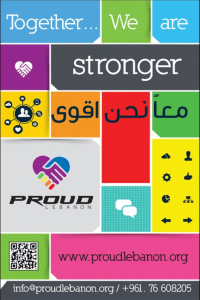"I admire their courage," says Bertho Makso from Proud Lebanon, referring to LGBT-Refugees who have fled to Lebanon from Syria in particular, but also from Palestine, Sudan and Iraq. (The first part of our Lebanon report you can find here.)
"Many of them have literally been through hell and some of them are seriously injured. Their bodies are covered in haematomas from head to toe - unmistakable traces of unbearable torture. "They were hung by their hands from a roof and left to dangle there for hours". The influx of refugees not only brings Proud Lebanon to the brink of its capacity, but also causes problems with the LGBT community in its own country.
"Many of the refugees lack the most basic things and therefore need help," explains Bertho. "However, many Lebanese people are not much different. We keep seeing cases of homeless gay men who have been thrown out of their homes by their families, who have lost everything: their jobs, their homes, the support of their families, and we don't know where to house these people."
Bertho fears that the mood within Lebanon's queer scene could change - and for quite surprising reasons. On the one hand, there is the envy that the world's attention is focussed entirely on the fate of the refugees.
But while refugees still have the opportunity to turn to the various international NGOs in the country for help, Lebanese LGBT people can hardly hope for help and support. And while refugees generally only see Lebanon as a stopover on their way to Canada, Europe or Australia, countries where LGBT rights are always better, Lebanese lesbians and gays are left behind - with no chance of a better life.
But also because many gay refugees get by with sex work (Bertho uses the term "surviver sex"), some fear for the public image of homosexuals. Resentment and prejudice are spreading in the scene.

Proud Lebanon wants to tackle this by trying to integrate refugees into the community so that both sides can get to know each other and overcome their prejudices. "We don't differentiate between refugees and locals. Everyone has the same needs and hardships, and we feel responsible for that," Bertho is keen to emphasise.
This includes not only HIV and STI tests, but also art and theatre workshops in which refugees can deal with their traumas. They also try to give them a professional perspective and offer, for example, tailoring, cookery and hairdressing training alongside English lessons.
The Proud Lebanon team is currently working on many different areas - from healthcare to refugee support. It won't be possible without support from abroad, Bertho openly admits, and is not hoping for donations alone. "We are open to all offers and ideas," says Bertho. They would also like to benefit from the many years of experience in the field of LGBT work and HIV prevention, for example through training and help in setting up and expanding the various programmes. In June, initial contacts were made with the Berlin Gay Counselling Service and the German AIDS Service Organisation, for example.
One thing is clear: the situation in the Middle East hotspot is not going to ease any time soon; and gays and lesbians in Lebanon are also watching developments in neighbouring Syria with concern. What if IS also breaks through the border to Lebanon? It cannot be ruled out, especially since, as Bertho says, there are definitely people in the country who sympathise with the Islamic State. Should it come to that, he would also leave Lebanon, says Bertho. However, he still sees his task as making a difference "and making life easier for those LGBT people who live in the country - refugees and locals alike."
To the first part of our report on LGBTs in Lebanon
Proud Lebanon is currently looking after several hundred queer refugees in Beirut. The available financial and human resources are no longer sufficient. Donations are therefore urgently needed. A crowdfunding platform has been set up for this purpose. https://life.indiegogo.com/fundraisers/1313819
Even small amounts help!










